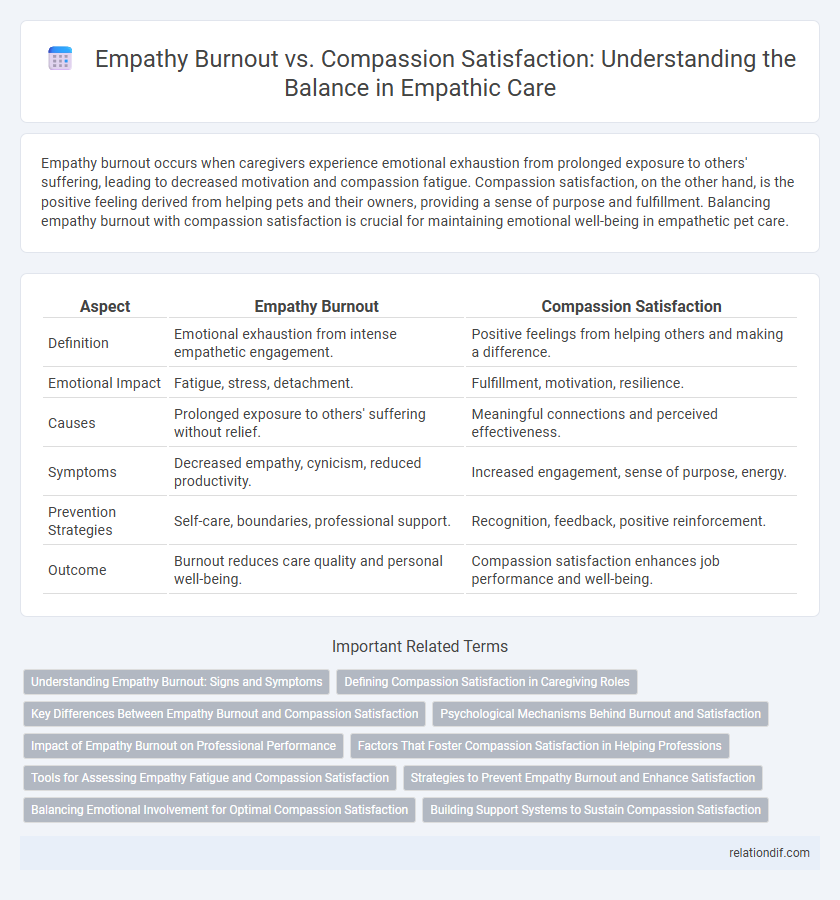Empathy burnout occurs when caregivers experience emotional exhaustion from prolonged exposure to others' suffering, leading to decreased motivation and compassion fatigue. Compassion satisfaction, on the other hand, is the positive feeling derived from helping pets and their owners, providing a sense of purpose and fulfillment. Balancing empathy burnout with compassion satisfaction is crucial for maintaining emotional well-being in empathetic pet care.
Table of Comparison
| Aspect | Empathy Burnout | Compassion Satisfaction |
|---|---|---|
| Definition | Emotional exhaustion from intense empathetic engagement. | Positive feelings from helping others and making a difference. |
| Emotional Impact | Fatigue, stress, detachment. | Fulfillment, motivation, resilience. |
| Causes | Prolonged exposure to others' suffering without relief. | Meaningful connections and perceived effectiveness. |
| Symptoms | Decreased empathy, cynicism, reduced productivity. | Increased engagement, sense of purpose, energy. |
| Prevention Strategies | Self-care, boundaries, professional support. | Recognition, feedback, positive reinforcement. |
| Outcome | Burnout reduces care quality and personal well-being. | Compassion satisfaction enhances job performance and well-being. |
Understanding Empathy Burnout: Signs and Symptoms
Empathy burnout manifests through emotional exhaustion, cynicism, and reduced personal accomplishment, often affecting healthcare professionals and caregivers exposed to continuous emotional strain. Common signs include chronic fatigue, irritability, detachment from patients or clients, and decreased empathy response, signaling the body's response to prolonged stress and emotional overload. Recognizing these symptoms early allows for interventions such as self-care strategies and professional support to prevent long-term psychological and physical health consequences.
Defining Compassion Satisfaction in Caregiving Roles
Compassion satisfaction in caregiving roles refers to the positive feelings and fulfillment derived from helping others and making a meaningful difference in their lives. It encompasses a sense of achievement, purpose, and emotional reward that counterbalances the emotional strain associated with empathy burnout, where caregivers experience exhaustion and reduced capacity to empathize. Maintaining compassion satisfaction is crucial for sustaining motivation, resilience, and overall well-being in demanding healthcare and social service professions.
Key Differences Between Empathy Burnout and Compassion Satisfaction
Empathy burnout occurs when prolonged exposure to others' suffering leads to emotional exhaustion, detachment, and reduced ability to empathize effectively. Compassion satisfaction, on the other hand, arises from the positive feelings and fulfillment gained through helping others, enhancing resilience and job satisfaction. Key differences include the emotional outcomes, with empathy burnout linked to stress and fatigue, while compassion satisfaction promotes motivation and psychological well-being.
Psychological Mechanisms Behind Burnout and Satisfaction
Empathy burnout arises from prolonged exposure to others' distress, triggering emotional exhaustion, depersonalization, and reduced personal accomplishment due to chronic activation of the stress response system. In contrast, compassion satisfaction stems from positive reinforcement through feelings of accomplishment and meaningful connection, engaging the brain's reward pathways and promoting psychological resilience. The balance between these psychological mechanisms determines whether caregiving professionals experience depletion or fulfillment in their empathetic roles.
Impact of Empathy Burnout on Professional Performance
Empathy burnout significantly diminishes professional performance by inducing emotional exhaustion, reduced concentration, and decreased motivation, which impair decision-making and interpersonal interactions. Healthcare providers experiencing empathy burnout often exhibit lower patient satisfaction scores and higher error rates, reflecting compromised quality of care. Conversely, maintaining empathy resilience can enhance compassion satisfaction, promoting sustained engagement and improved outcomes in demanding work environments.
Factors That Foster Compassion Satisfaction in Helping Professions
High levels of social support, effective self-care practices, and a strong sense of professional purpose significantly foster compassion satisfaction among helping professionals. Access to adequate supervision, opportunities for professional development, and maintaining work-life balance contribute to resilience against empathy burnout. Positive work environments that encourage recognition and peer connection enhance emotional well-being and sustain motivation in caregiving roles.
Tools for Assessing Empathy Fatigue and Compassion Satisfaction
Empathy burnout and compassion satisfaction can be accurately assessed using tools such as the Professional Quality of Life Scale (ProQOL), which measures compassion fatigue, burnout, and compassion satisfaction through self-report questionnaires. The Maslach Burnout Inventory (MBI) evaluates emotional exhaustion, depersonalization, and personal accomplishment, providing insights into empathy fatigue in caregiving professions. These validated instruments facilitate early identification and intervention for empathy-related stress while promoting strategies to enhance compassion satisfaction.
Strategies to Prevent Empathy Burnout and Enhance Satisfaction
Implementing regular self-care routines, setting clear emotional boundaries, and seeking peer support are effective strategies to prevent empathy burnout and enhance compassion satisfaction. Engaging in mindfulness practices and professional counseling helps maintain emotional resilience, while recognizing and celebrating small positive impacts reinforces a sense of fulfillment. Organizations that promote a supportive work environment and provide resources for stress management contribute significantly to sustained empathy and overall well-being.
Balancing Emotional Involvement for Optimal Compassion Satisfaction
Balancing emotional involvement is critical to prevent empathy burnout while fostering compassion satisfaction in caregiving roles. Maintaining healthy boundaries and practicing self-care strategies such as mindfulness can enhance resilience and emotional regulation. These approaches support sustained compassion satisfaction by enabling caregivers to remain deeply connected without becoming overwhelmed.
Building Support Systems to Sustain Compassion Satisfaction
Building robust support systems is essential to sustaining compassion satisfaction and preventing empathy burnout among caregivers and healthcare professionals. Structured peer support groups, regular supervision sessions, and access to mental health resources foster resilience and emotional recovery. Integrating organizational policies that promote work-life balance and acknowledge compassionate efforts significantly enhances long-term well-being and job satisfaction.
Empathy Burnout vs Compassion Satisfaction Infographic

 relationdif.com
relationdif.com